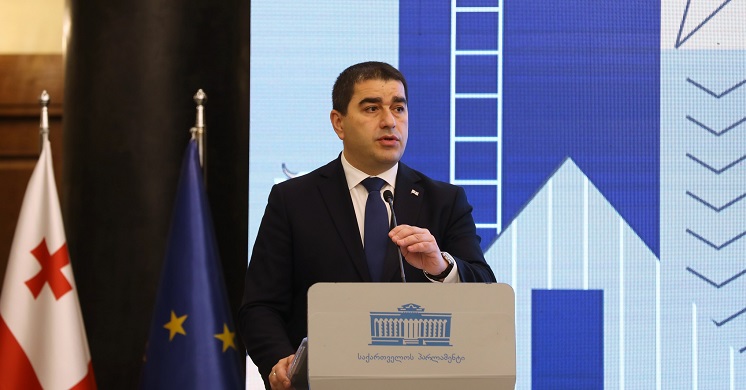Georgian Parliament Speaker: “politically biased” reports by “elite NGOs” used by foreign organisations

Speaker Papuashvili was commenting following the 2024 World Report by Human Rights Watch. Photo: Shalva Papuashvili’s Facebook
Georgian Parliament Speaker Shalva Papuashvili on Friday slammed “politically biased” and “speculative” assessments by the “elite” domestic non-governmental sector, which he claimed were subsequently “inserted” into reports of foreign organisations with political aims.
Papuashvili was commenting following the 2024 World Report by Human Rights Watch, published this week, which made a mention of the controversial Foreign Transparency Bill, retracted by the Georgian Parliament in March 2023 after mass protests in Tbilisi.
The Report also critically noted changes in accreditation rules for media in the domestic legislative body, with the Speaker claiming the document had been based on evaluations by domestic NGOs.
With regard to the former issue, the Report said the Georgian authorities had attempted to adopt the piece of legislation that “would have undermined freedom of expression” by designating non-commercial legal entities and media outlets in the country as “agents of foreign influence” if they derived more than 20 percent of their funding from abroad.
It also pointed to “lack of accountability for law enforcement abuses, especially related to freedom of assembly”.
On the latter topic, the release said in February 2023 the Parliament had passed new, “restrictive regulations” on media accreditation, which allowed the authorities to ban journalists from asking MPs questions after they refused to be interviewed. It noted officials had cited alleged harassment of lawmakers by journalists to justify the amendments, which it said could hamper the work of critical media.
In his response, Papuashvili claimed the allegations by “elite NGOs” about law enforcement exceeding their powers in actions against public rallies held since 2019 in capital Tbilisi had been “rejected” by judgements of the European Court of Human Rights.
It is evident that visions and perceptions of elite NGOs that receive the biggest portion of foreign funding are a part of their political struggle and the method with which international conclusions are weaponised”, Papuashvili said, adding the ECHR had rejected the organisations’ claims over domestic law enforcement in “various cases” and concluded the police had acted in accordance with the law.
Speaking about the Foreign Transparency Bill, Papuashvili said the law was “now widely accepted as necessary” due to “covert” foreign funding of domestic organisations. The official specifically named the European Foundation for Democracy in allegations of “direct sponsor[ship of] extremism” in the country.
He also claimed the organisation “encourages extremism and radicalism” by “covering [court] expenses of those who have assaulted police and the Parliament building [in Tbilisi during protests]”.
With regard to a question on regulations for issuing accreditations for the media in the lawmaking body, Papuashvili said the country’s Constitutional Court was examining the matter, and added the review would rule whether reporters “chasing after lawmakers or visitors in the halls of the Parliament” following their refusals of comments would be ruled as acceptable.
 Tweet
Tweet  Share
Share